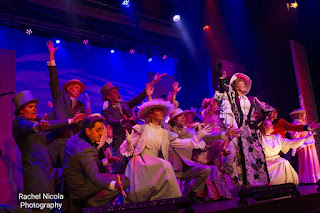Scaramouche Jones or the Seven White Masks | 4 Star Review
How does one measure a life and one’s progress from baby to a corpse? According to Shakespeare, “All the world’s a stage, and all the men and women merely players; They have their exits and their entrances, and one man in his time plays many parts, His acts being seven ages.” The seven ages of man is a concept that resonates with many people, and none more so than the aged clown in Justin Butcher’s moving play Scaramouche Jones or The Seven White Masks.

The play starts late on the 31st of December 1999 with the white-faced clown Scaramouche (Shane Richie) coming down the stairs to his dressing room after finishing his last show of the 20th Century. Scaramouche has plans to mark the millennium in a unique way, for tonight is not only his 100th birthday but also, the final day of his life. However, before shuffling off this mortal coil, Scaramouche wants to tell his story. One which starts at the end of the 19th Century and runs throughout the 20th. Born from the union of a Trinidadian gypsy prostitute and one of her English clients, Scaramouche has had an eventful, if not the easiest of lives. Orphaned, sold into slavery, and being forced to do unspeakable things for the Nazis, Scaramouche has Lived with a capital ‘L’ and is the epitome of someone with a life less ordinary.
Before delving fully into my impressions of this production, I have to confess that I have a mild case of coulrophobia. Seriously, how can anyone like and laugh at clowns? I can’t even watch the trailer for the movie ‘It’ without feeling a sense of fear and dread, so I think I should be commended for even clicking the link to watch this show.
And to be honest, I’m really glad I did because this is a performance that I would have kicked myself if I’d missed it. One of the problems with online productions I find is that unlike in a theatre, it is easy for something – the dog wandering in for a pat, the flatmate asking if I want a coffee, etc – to distract me. But that didn’t happen in this case. The exquisite combination of Justin Butcher’s writing and Shane Richie’s performance combined to keep my eyes fixated on the screen throughout.
There is a Shakespearean quality to Justin’s writing which ensures the narrative, like a flowing river, picks up the viewer and takes them along Scaramouche’s life journey until finally depositing them into the ocean on emotions engendered by the very moving ending. For me, the entire story had a distinctive ring of authenticity about it, and at no point did I wonder if there were elements of embellishment in Scaramouche’s tale. This is because, while it was extraordinary it was also fairly tame. Scaramouche barely mentioned the great things happening in the 20th century, except to give the viewer a reference point. The first world war gets hardly a mention which, given what was happening to him at the time made sense, and his participation in WWII is something most people would have wanted to hide, not talk about.
I think some of this authenticity also comes from Ian Talbot’s direction. No live audience – so Scaramouche tells his story to what feels like CCTV cameras – complete with date/time stamps showing the inexorable march to midnight on new millennium eve. Designer Andrew Exeter has created a simple but effective dressing room set, with a huge shimmering red cloth covering the stairs and providing interesting changes to the set and the mood depending on which camera we are viewing the story from. I do think there was an issue with sound as, at points, the sound effects almost drowned out Shane’s speech, but this wasn’t too bad and didn’t detract from the performance too much.
Speaking of which, in the end, the best script and story needs a truly amazing performer to make it work, and this is especially true of a monologue. and Shane Richie delivers what I believe, is one of the most outstanding performances of his career so far, in bringing Scaramouche to life. For over an hour and a half, I sat transfixed by Shane’s performance. I shared the highs and the lows – and there were plenty of both – and, like Scaramouche himself, wept as he described his life and death in the Nazi camp. By the end, I loved this character, even if he was a clown, and I felt the final mask fitted perfectly. Justin could have easily made this play longer, but I rather liked the way it, to my mind, came to a natural conclusion as Scaramouche found himself in the one place he wanted to be and settled to live a quiet life and, as the 20th gave way to the 21st Century greeted the new millennium in the perfect way.
![]()
Review by Terry Eastham for London Theatre 1

Comments
Post a Comment